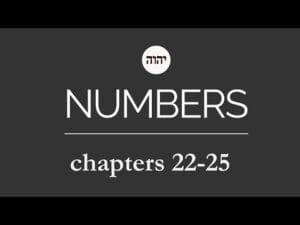
Numbers 34-36 Bible Teaching
Numbers 34-36 detail land distribution, Levites' 48 cities, cities of refuge, and laws on murder vs. manslaughter. Emphasizes justice, mercy, and spiritual teachings.

Verse by Verse Teachings is an in-depth, methodical study of the Bible led by Shawn McCraney. Launched in 2013, these teachings are dedicated to helping individuals understand every single verse scripture in its purest, most contextual form—free from institutional biases or doctrinal agendas.
Whether you’re new to the Bible or seeking deeper insights, these teachings will equip you to understand the text in historical, cultural and exegetical context – outside of the bounds of religious tradition.

Numbers 34-36 detail land distribution, Levites' 48 cities, cities of refuge, and laws on murder vs. manslaughter. Emphasizes justice, mercy, and spiritual teachings.

Moses appointed Joshua, who consulted Eleazar via Urim and Thummim. Shawn teaches resurrection as spiritual reconciliation. Vows were binding unless opposed. God's actions are loving and just. Christ is the faith's foundation, tested by fire. Reuben and Gad's land request symbolizes spiritual growth. Trust in God's provision is emphasized.

The teaching discusses God's immutability, the Spirit's presence before Pentecost, and the shift in divine-human relations post-Christ, emphasizing spiritual empowerment and continuity.

Balaam, a prophet with genuine prophetic abilities, is portrayed negatively due to his greed and misalignment with God's will, leading to Israel's betrayal. The teaching emphasizes discernment in spiritual matters, highlighting Balaam's failure to wait for God's conditions and the irony of his talking donkey seeing an angel. Despite being hired to curse Israel, Balaam blesses them, prophesying a Messianic future. The narrative warns against Balaam's deceitful influence and stresses the importance of aligning with God's will, as exemplified by Phinehas' zealous actions.
Moses and Aaron barred from Promised Land due to disobedience. Aaron's death passes priestly role to Eleazar. Emphasizes faith over earthly rewards, idol rejection, and salvation through Yeshua.
The teaching focuses on Aaron's rod as a symbol of divine leadership and spiritual growth, the Levites' dedication, the red heifer's ritual significance, and Christ as the spiritual Rock, urging unity and maturity in faith.
Moses' teachings in Numbers 15 stress accountability for sins, sincere adherence to God's laws, and consequences for defiance. True faith is inward, not outward.
Shawn's teaching contrasts human reliance on self with faith in God, using biblical examples like the Israelites' journey. Emphasizes spiritual freedom through divine trust.

Moses sends 12 leaders to scout Canaan; Joshua and Caleb show faith, urging trust in God despite fear. David's faith in God overcomes Goliath, teaching reliance on divine strength.
The teaching summary contrasts hedonism with true contentment, highlights altruism's role in happiness, and explores Moses' leadership, familial conflicts, and divine communication.
Murmuring leads to divine punishment; Moses shares leadership with 70 elders; emphasis on faith, obedience, genuine leadership, spiritual authority, and open ministry.
Purification of Levites, First Passover, God's guidance via cloud/fire, balance freewill with faith, patience, spiritual growth, Moses' leadership, quail/plague warning.
Numbers details Israelite census, tribal organization, Levite duties, and camp arrangements. It covers the Levites' priestly role, the Rite of Jealousy, and Nazarite vows.